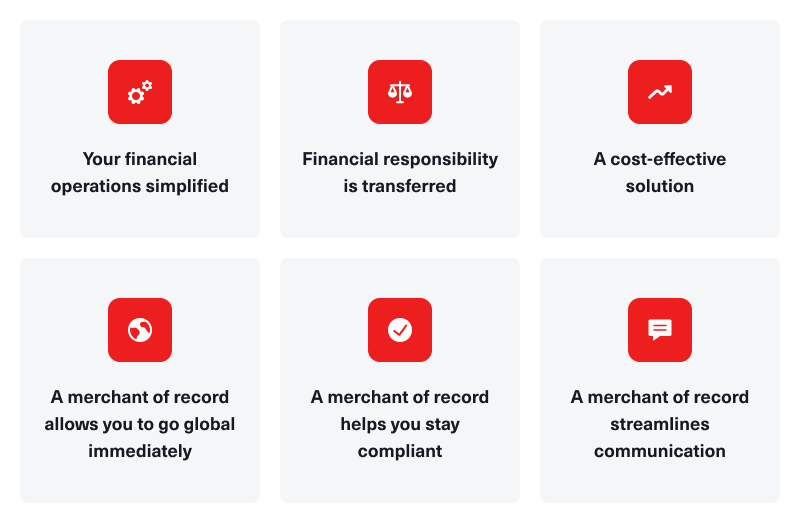The videogame market has grown like crazy over the last few years, with around 3 billion people worldwide now gaming in one form or another. With such a massive user base and a hugely diverse range of formats and genres, there's arguably never been a better time for indie developers to form a videogame company and start selling their creations online.
Although there are undoubtedly some incredible opportunities out there to make a full-time living from selling digital games and apps online, the actual business of taking payments for those downloads can be daunting.
As you're undoubtedly aware, building a website or eCommerce store is only the first piece of the puzzle. Many would-be videogame entrepreneurs quickly come unstuck when faced with the hurdles of payment processors, taxes, regulations, refunds and more.
If you've considered selling videogames yet have encountered a wall of complexity when it comes to processing payments, then a Merchant of Record (MoR) solution might be just what you need to get your business up and running with the minimum of fuss.
In this article, we'll help you to understand what a Merchant of Record solution is, and how it can benefit game developers. But first, let's look at two solutions you may have already heard of — payment service providers and payment gateways — to see how a Merchant of Record model differs.
Payment service providers
A payment service provider (PSP) — as the name suggests — provides a full suite of services to enable sellers to accept payments. A PSP will typically offer clients their own merchant accounts, payment gateways and other tools, plus handle all of the technical processing required from the moment a card transaction (or other payment method) is made to when funds arrive in the business owner's account.
When a business owner uses a payment service provider, the PSP will assess the financial risk they are about to take on, and take the necessary steps to mitigate that risk. Meanwhile, the business owner will be responsible (liable) for everything, including meeting all of the relevant consumer laws and statutory rights, and dealing with taxes.
Payment gateways
Payment gateways are usually (though not always) offered by a payment service provider and form the link between your website's checkout, the customer, and their chosen payment method.
To understand the function of an online payment gateway, it can be helpful to think of your website in terms of a bricks-and-mortar shop: A customer chooses a product, takes it to the counter (the online checkout) and pays using a card reading machine (the payment gateway) that processes the payment details.
Although a payment gateway is a vital tool for taking online payments, you'll still need to find a bank, a card acquirer and other "nuts and bolts" services to make the gateway function — features typically provided by a payment service provider.
How does a Merchant of Record differ?

Now that you understand the function of a PSP and a payment gateway, you'll almost certainly recall encountering these kinds of solutions when you've paid for goods and services at an online checkout. However, although a Merchant of Record solution looks almost identical to the consumer, the service functions very differently from a business owner's perspective.
In essence, a Merchant of Record offers a total eCommerce solution, handling online transactions and providing developers with all of the tools they need to sell videogames online, without worrying about complex legal contracts and financial responsibility.
The main thing to understand about a Merchant of Record is that it acts as an intermediary reseller. The MoR receives full payment from the customer for your games and then pays you for them — usually minus a percentage fee. Even when selling a game from the checkout of your own website, the payment is processed in the name of the Merchant of Record who owns the backend merchant account.
Effectively, then, the game developer agrees to "give" the Merchant of Record a copy of the game on the promise that the MoR will repay them when they make a sale.
Common payment challenges faced by videogame businesses
Regulatory changes
Regulations can be a huge headache if you're trying to sell videogames. The gaming industry is highly regulated, and laws are updated often. In addition, individual policies vary tremendously from country to country, so you'll need to ensure that you remain compliant in all the markets you intend to sell within.
Fraud and chargebacks
A chargeback is a transaction made on a card that has been reversed by the issuer after a successful dispute by the customer. Chargebacks are a valuable mechanism for consumers, allowing them to recover funds if there's a legitimate issue with a purchase.
Unfortunately, the gaming sector suffers a high volume of chargebacks compared to other industries. Parents may dispute a purchase made by children without their permission, and many more chargebacks are instigated by fraudsters looking to download a game for free.
When fraudulent chargebacks are added to the broader list of nefarious activity — including hacked accounts, data breaches and other scams — the outlook isn't good for an independent developer or studio looking to manage their own game sales.
Risk mitigation
Now you know that chargebacks and fraud are increasingly commonplace in the videogame industry, you won't be surprised to learn that many payment service providers consider gaming companies "high risk". When fraud and chargeback rates are unacceptably high, sellers can have their accounts terminated and even be fined on behalf of card issuers like Visa or MasterCard. If your company suffers from prolonged issues with chargebacks and fraud, it might be blacklisted entirely by financial service providers, or, at the very least, incur increased processing fees.
Frictionless gaming experiences
As big-name videogame studios continue to raise the bar with their triple-A releases, gamer expectations about user experience rise in tandem. When presented with a payment page, players expect a smooth, secure, and professional transaction that doesn't get in the way of their gaming session. Fast, or ideally single-click payments, via their favourite payment method are now considered the norm for today's gamers.
Global coverage
Gaming is now very much a globally-popular pastime. Developers often rely on international sales to make a decent income, even when releasing a small, independent title. That means they must find a way to take payments in multiple currencies and enable multi-language functionality on their payment pages.
The advantages of using a merchant of record

Legal protection for sales and distribution
When using a Merchant of Record, developers and videogame businesses hand the legal right to sell their titles to the MoR, who in turn signs an agreement to distribute the games on their behalf, and becomes the sole legal entity. Although a videogame developer could theoretically make more money by doing all the work themselves, a complex legal and liability related minefield lies in wait for the unprepared.
One solution for all markets and payment scenarios
Because Merchants of Record deal with multiple payment service providers, developers using their services will enjoy optimum coverage across all regions while benefiting from a greater spread of features to handle international payments.
Protection from fraudulent activity
As you're now aware, fraud and chargebacks are a huge problem for the gaming industry, with many payment service providers considering the sector "high risk". Merchant of Record services specialising in videogame sales usually have dedicated teams on hand to monitor and detect fraud and chargebacks.
Realistically, it's unlikely that a developer or videogame company will be able to review all credit and debit card transactions manually for dubious activity — certainly not without throwing considerable resources at the problem. On the other hand, a Merchant of Record will use highly sophisticated anti-fraud software to spot illegal activity and chargeback management tools to prevent illegitimate claims.
Efficient refunds
Not all refund requests are fraudulent. When a customer has a genuine issue with your product, reimbursing them in a timely, efficient manner is paramount when building you or your studio's reputation. If your company is fortunate enough to make a decent sales volume, keeping on top of refunds can be a challenging process that's highly prone to error — especially if you're juggling multiple payment methods, currencies and jurisdictions at your checkout.
As you've probably guessed, a Merchant of Record will take care of your refunds, as they replace you as the responsible seller. With an MoR partnership, you'll gain easy access to a team of skilled professionals who understand the applicable laws, as well as ready-made refund policies for full transparency.
Sales tax compliance
If you sell videogames across borders, you'll be responsible for collecting sales tax in each jurisdiction a sale is made. Yes, places like the UK have "double taxation agreements" with other countries, however, the business of collecting and remitting tax on your game sales still requires extensive knowledge, detailed record-keeping and expensive accounting.
Tax compliance is one area where a Merchant of Record solution particularly excels. Because the MoR technically "owns" your games and the profits from each sale, they are responsible for collecting and reporting all sales taxes. Meanwhile, although you'll still be required to file tax returns, all your game sales will derive from a single entry — the Merchant of Record itself.
Enhanced data protection and privacy
Like tax collection and regulatory compliance, the business of data protection is also outsourced when partnering with a Merchant of Record. With the MoR responsible for protecting customer data and privacy, your company can largely avoid the complexities of GDPR and CCPA laws and regulations — both of which can lead to devastatingly high penalties if not followed to the letter.
In addition to data protection laws, various internationally-recognised security standards must also be adhered to by anyone selling online, including:
- Payment Card Industry Data Security Standards (PCI DSS);
- System and Organization Controls (SOC 2);
- Information Technology Infrastructure Library (ITIL).
The details of these standards are far beyond the scope of this article. Suffice it to say that it can require dedicated staff members with years of experience to ensure compliance. Working with a Merchant of Record ensures that your company is up to date with all of the relevant data protection frameworks, and avoids any damage that could occur to your reputation as a result of a breach.
Smoother payment flow
A Merchant of Record makes your entire payment process simple and efficient — for both you and your customers. When you outsource and delegate all of your transactions to a single third-party provider, you avoid the responsibility of managing payment processing and everything that the process entails.
Enhanced customer support
Finally, and perhaps most importantly, a Merchant of Record offers your business a turnkey support package that could include everything from email support tickets to live chats, social media messages and even call centres. Offloading all payment-related queries in this manner can save your company significant time and money over the long term.
A Merchant of Record partnership can accelerate your gaming company’s growth

As the videogame industry continues to grow, more and more opportunities are being presented to independent developers and game companies. Although publishing games can be a lucrative business model, the necessity of selling and scaling globally can bring with it plenty of unwanted complexity. Although it's always tempting to try and handle every aspect of a business in-house, ultimately, outsourcing payments and online sales to a Merchant of Record service can free up vital resources that are better deployed on design, development and marketing.








